![]()

"European researchers have created an interface between mammalian neurons and silicon chips. The development is a crucial first step in the development of advanced technologies that combine silicon circuits with a mammal’s nervous system.
The ultimate applications are potentially limitless. In the long term it will possibly enable the creation of very sophisticated neural prostheses to combat neurological disorders. What's more, it could allow the creation of organic computers that use living neurons as their CPU...
The matrix emerges to facilitate your avatar's freedom of movement?

The OpenSource Metaverse Project
In last week's Economist, an interesting article profiles Iqbal Quadir, an entrepreneur of the developing world. His pioneering work in Bangladesh, including the development of Bangladesh's largest telecoms operator, can be seen as an example of how technology and markets may bootstrap themselves and generate prosperity and growth. Whereas government planning and international aid operates from the top-down, functioning at the macro poitical level, micro-credit-enabled schemes with innovative partnerships and vision may stimulate knock-on economic benefits from the bottom-up far beyond what governments can deliver.
These processes don't just occur by themselves though. Visionaries such as Quadir are pivotal to catalysing such developments. Some issues this throws up are:
1. The effectiveness of macro-level politics, including national governments and international develpoment organizations, in driving economic and social change: there is plenty of evidence of the positive effects of government policies for combatting poverty - China, for example, where millions have been lifted out of poverty in the last 20 years - and of successful development programmes, but the reliance of planning and implementation from the macro level must be questioned in the light of there being more effective strategies for social and economic development.
2. The importance of leadership, or key figures, to act as catalysts for change: how does this fare in a world we are increasingly understanding in terms of impersonal self-organizing processes, where human subjectivity is being processed and questioned as the Singularity draws near? Must the key drivers of change be philanthropic? It seems there are huge profits to be made regardless.
3. The interconnectedness of economic prosperity, technological enablement, and entrepreneurial innovation: technology begets technology, especially when it is innovative and commercialized; wealth begets wealth, especially when it is technologized and driven entrepreneurially; and innovation begets innovation, especially when it is technological-enabled and commercialized.
Sadly, however, innovation does not come from the state, however its policies may wish to encourage it. Government must relinquish power to the people at the grassiest of levels, in terms of removing obstacles to doing business and encouraging them through credit and financial initiatives suitable at those levels. This is where the banking industry has hitherto failed not just poor people, but the globalizing economy. Since richer people in Bangladesh and other poor countries will be better producers of goods and services for customers elsewhere, and will be better customers for producers elsewhere.
4. The necessity of sustainable energy for commercial success and economic take-off: this example shows how a process of self-reinforcement can occur with the availability of electricity and its increasing use and demand. An increase in energy is required for any increase in economic growth, but this does lead to the huge issue not covered in this article, namely the sustainability of energy. This is probably huge enough to warrant a post in itself.
What other issues does this throw up, and what are the key issues of all of these?
Below is the full text:
Power to the people
Mar 9th 2006
From The Economist print edition
Iqbal Quadir pioneered wider access to mobile phones in Bangladesh. Can he do the same for electricity and clean water?

AS A young boy in rural Bangladesh in 1971, Iqbal Quadir walked ten miles to collect some medicine for a sibling who was unwell. But when he arrived at his destination, the medicine man was not there, so he had to walk home empty-handed, having wasted an entire day. Many years later, having moved to America and become an investment banker, Mr Quadir was reminded of this episode when the network at his New York office stopped working. Without communications, he realised, people are far less productive, whether in a modern office or a rural village; a simple telephone call could have prevented him from making that unnecessary round trip all those years earlier. As he waited for the e-mail to start flowing again, Mr Quadir was seized by the idea that “a telephone is a weapon against poverty”. He decided to dedicate himself to making telephones more widely available to the poor in his homeland. “I didn't know anything about telecoms,” he says. “But maybe that was helpful.”
It was only after having many fruitless meetings with firms and policymakers that Mr Quadir finally hit upon the right approach. He was inspired by Grameen Bank, a Bangladeshi organisation well known for supplying “microcredit”, or small loans, mainly to the rural poor. In a typical example, a woman borrows enough money to buy a cow, and then repays the loan using the profits that result from selling its milk. The loan is repaid, the woman earns an income from the cow, and her neighbours can buy milk. Mr Quadir looked at this model and realised that “a cell phone could be a cow”. He formed a consortium with Grameen Bank and Telenor, a Norwegian mobile operator that provided the required telecoms expertise. He was then able to secure loans from development banks and aid agencies, and won a licence from the Bangladeshi government. GrameenPhone launched its service in March 1997, and today has more than 6m subscribers, making it the country's largest telecoms operator. Bangladesh now has six mobile operators and more than 9m subscribers in what has become a booming market.
Around 200,000 of GrameenPhone's subscribers are “telephone ladies” who provide access to telephony in more than 50,000 rural villages, with a total population of 80m people. Despite accounting for a small proportion of the mobile phones in circulation, these “village phones” account for one-third of the traffic on the network, since they are shared between a large number of users. By making telephony widely available, says Mr Quadir, GrameenPhone has increased the country's GDP by a far greater amount than repeated infusions of foreign aid. Mobile phones promote economic activity, prevent wasted journeys, make it easier to look for work, and widen access to markets. GrameenPhone is not a charity, but a profitable venture: it made net profits of $101m in 2004. Its approach is now being replicated in other countries in Asia and sub-Saharan Africa, including Uganda and Rwanda.
GrameenPhone's success is a striking endorsement of Mr Quadir's unusual approach to promoting economic development. The problem with the traditional top-down approach of supplying developmental aid to governments, he complains, is that it widens the gap between politicians and the people, by increasing the power of central authorities. “The key to economic progress in Bangladesh does not lie in foreign aid, but in the hands and brains of its masses,” he says. “We need to find technologies that can activate those hands and brains for productive purposes.” Using technology to empower citizens from below, as mobile phones do, is a far better way to promote development, says Mr Quadir: “Top-down approaches do not work. The bottleneck is at the top of the bottle.”
Between the geek and the meek
There are historical precedents for this bottom-up approach, notes Mr Quadir, who lectured in technology and economic development at Harvard University's Kennedy School of Government for four years from 2001 and has recently moved to the Massachusetts Institute of Technology, where he is establishing a new programme in development entrepreneurship. In medieval Europe, innovations such as spectacles, water wheels, clocks and printing had the effect of empowering people from below and stimulating economic development, often in the face of opposition from church and state. Similarly, the industrial revolution was the result of entrepreneurial, bottom-up activity, not government planning. Having proven the effectiveness of his approach with GrameenPhone, Mr Quadir is now working to apply the same combination of technology and bottom-up entrepreneurship in other areas, starting with the supply of electricity. “I see myself as an entrepreneur between the geek and the meek,” he says.
The aim of his new venture, Emergence Energy, is to establish small, neighbourhood power plants in Bangladesh that can provide electricity to a handful of homes, shops and businesses. This time he has teamed up with Dean Kamen, an American inventor best known for creating the Segway electric scooter. During 2005 they conducted a six-month trial in two rural villages in Bangladesh of prototype generators, created by Mr Kamen, based on a design called a Stirling engine.
The generators can be powered by biogas extracted from cow manure. The idea is that one entrepreneur, funded by a microcredit loan, sets up a business to turn manure into methane gas and fertiliser; another entrepreneur, also funded by microcredit, buys the methane to power the generator, and sells the resulting electricity. This will, Mr Quadir hopes, unleash all kinds of economic activity. “Energy gives you the power to empower,” he says.
The trial was intended as a test, to find out what people would use electricity for, and whether there was an economically viable business model. The results were promising: the scheme proved to be technically feasible, there was strong demand for electrical power, and consumers were willing to pay for a regular supply. The main use of electricity was for lighting, says Mr Quadir; using low-power bulbs, each generator, which produces one kilowatt of power, was able to light up 20 households or shops.
This allowed shops to stay open later, enabled students to study for longer hours, and let people enjoy television and other forms of entertainment. Surprisingly, Mr Quadir found that some households already had televisions, powered using car batteries. Such batteries are also used to recharge mobile phones. This suggests that the potential “chicken and egg” problem that there would be no demand for electricity, since nobody owns any electrical appliances, will not arise. Access to a regular supply of electricity should, however, promote the wider adoption of electrical devices of all kinds.
The next step is to mass produce the generators so that the scheme can be launched commercially. Mr Quadir says he hopes to convince a manufacturing company to license Mr Kamen's design and set up a factory in Bangladesh to build the generators. This would have several advantages over simply importing the technology (as happened with the mobile phones): it would create jobs, avoid import tariffs that would otherwise make the generators less affordable, and the resulting transfer of technology and skills would ensure that the machines could be fixed by locals, rather than having to rely on foreign technicians.
To finance the purchase of the generators by entrepreneurs, Mr Quadir is working with BRAC, another microcredit lender. The generators will cost several thousand dollars, far more than a mobile phone. But microloans are already being used to finance larger purchases, such as houses, says Mr Quadir, so he is confident that the microcredit model can be applied to the new venture. The result, as entrepreneurs start to install generators in villages, will be to produce electricity, fertiliser and jobs.
Bubbling up
At the same time, Mr Quadir is pursuing two other bottom-up initiatives. The first, CleanWater, is dedicated to supplying safe drinking water to Bangladeshi villages, where arsenic contamination is a grave problem. Rather than relying on aid agencies or governments to install equipment, Mr Quadir hopes to license a chemical preparation that can remove arsenic from water and make it safe to drink. The chemical would then be distributed and sold, like salt, via a network of local entrepreneurs; Mr Quadir estimates that buyers would have to spend around $3 per person per year on the chemical to ensure a safe water supply, which is well within reach of most villagers. Again, this initiative would create jobs, provide a wider societal benefit, and give people the means to solve a serious problem themselves.
The second initiative, developed by Mr Quadir's brother Kamal, is called CellBazaar. The idea is to create an electronic marketplace that can be accessed via mobile phones—a phone-based equivalent of newspaper classified advertisements. If somebody wants to sell a bicycle, for example, they can list it in CellBazaar, where it will be visible to potential buyers, says Mr Quadir. This will also have the effect of making price information more transparent and widely available. The system is designed to be as simple as possible: it will not handle transactions, but will simply put buyers and sellers in contact with each other via mobile phone. It will be possible to access the system using just text messages. Electronic commerce could prove to have even greater appeal in developing countries, where the transport infrastructure is often poor, than in developed ones.
Trying to change things from the ground up is more effective than lobbying authorities, insists Mr Quadir. “Without necessarily introducing enlightenment or new arguments, technology can quietly initiate novel ways of making things or trading them, potentially redistributing economic and political clout,” he says. Just as economists invoke the “invisible hand” of the market, he likes to speak of a technology as an “invisible leg” that can move an economy from one state to another.
And even when a government adopts a sensible policy, there is no guarantee it will be implemented. Before the establishment of GrameenPhone, for example, the Bangladeshi government's stated policy was to promote universal access to telecommunications; but in practice not much happened. The clear success of GrameenPhone, however, prompted the government to issue more mobile licences, which led to today's thriving market. Technology, in short, makes it possible to change the facts on the ground first, so that government policy can then follow, says Mr Quadir. Power to the people, indeed.
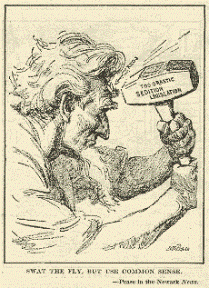
Nick, traxus4420 – this is a belated (and far from adequate) response to your comments.
“how is it possible to separate the positive powers of common sense from the dysfunctional legacies of primate evolution, for instance the 'intuitive' sciences Pinker describes” (Nick)
Firstly, I think that Pinker is a brilliant exponent of common sense:
This can be seen across the board in his writings, but particularly in his approach to language, which is very hands-on and evidence-based (in contrast to Chomsky’s pencil and paper analyses which lead to frequent absurdities (e.g. that children’s brains contain some form of information about 16th century root forms)), and in his rejection of pomo intertextuality and signification.paralysis.
His deployment of common sense is particularly effective when he lays into the parenthood advice industry, which preys on feelings of guilt and inadequacy to instruct parents as to how they can best shape their children’s intelligence and personality. The evidence suggests that genes, peer groups and chance are the main determinants of personality and that the behaviour of parents has comparatively little positive influence on the development of their children’s personalities. On hearing this, the knee-jerk reaction from parents who have invested energy and money in their children’s upbringing (and in the how-to-be-a-good-parent-industry) is to retort “So you’re saying it doesn’t matter how I treat my children?” And of course it matters because it’s clear they can have a massive negative impact through inflicting psychological or physical abuse. Evidence aside, common sense leads Pinker to ask why parents would even want to shape their children’s personalities, or buy into the belief that if they love their children their children they will turn out good, rather than love them because that’s what humans do in deep and satisfying relationships. We don’t try to shape the personalities of other adults, such as our partners, so why would we try to shape those of children?
“The fact that people can forget these simple truths when intellectualizing about children shows how far modern doctrines have taken us. They make it easy to think of children as lumps of putty to be shaped instead of partners in a human relationship… It is children, above all, who are alleged to be blank slates, and that can make us forget they are people.” (The Blank Slate 398-9)
Humans have been taken far from common sense when doctrinal authority dictates how a parent should relate to their offspring. An example of how parasitic memetic machinery manipulates and feeds off its host by unplugging common sense. Memes/ideologies/discourse have an amazing capacity for utilising the unknown, and fears about the unknown, at the expense of common sense, which is pretty well-equipped to get by.
These ‘modern doctrines’ include those which seek to tell us that: gender is a construct imposed by culture and society and has nothing to do with biology or innate psychology; and that rape has nothing to do with sex. ‘Healthy’ common sense rebels against such doctrines, instinctively dismissing them as absurd. And not just Western, post-Enlightenment common sense: non-pomo anthropology of an evolutionary bent asserts that all human societies acknowledge gender differences as biological and psychological givens. Evolutionary psychology and behavioural genetics are providing plausible theories and evidence to support the gut reactions of common sense - sometimes we and the world are not as complicated and inexplicable as some would like to have us believe.
Pinker’s project in The Blank Slate was to a) describe how the doctrines of the Enlightenment - the ghost-in-the-machine/blank slate/noble savage memeplex – are proven wrong by strands of contemporary science stemming from the theory of evolution and the computational model of the mind, and b) describe how these doctrines still provide the scaffolding for much of current thinking - rational and absurd varieties.
When it comes to politics, Pinker is very pro-Enlightenment, in the sense of consciously assuming certain moral principles to be universal, by deliberately ignoring scientific facts:
“The case against bigotry is not a factual claim that humans are biologically indistinguishable. It is a moral stance that condemns judging an individual according to the average traits of certain groups to which the individual belongs. Enlightened societies choose to ignore race, sex and ethnicity in hiring, promotion, salary, school admissions, and the criminal justice system because the alternative is morally repugnant… Regardless of IQ or physical strength or any other trait that can vary, all humans can be assumed to have certain traits in common. No one likes being enslaved. No one likes being humiliated. No one like being treated unfairly, that is, according to traits that the person cannot control… The Declaration of Independence proclaims, “We hold these truths to be self-evident; that all men are created equal.” The author, Thomas Jefferson, made it clear that he was referring to an equality of rights, not a biological sameness. For example, in an 1813 letter to John Adams he wrote ‘I agree with you that there is a natural aristocracy among men. The grounds of this are virtues and talents…’” (The Blank Slate p145)
The premise for Paine’s Common Sense was that natural rights are metaphysical truths, for the author of the Declaration of Independence they were ‘self-evident’ truths, and for Pinker they are consciously upheld fictions. It would have been interesting if Pinker had traced the lineage of these ‘self-evident’ truths back to Locke, the initial target in The Blank Slate. The blank slate and natural rights come together as part of Locke’s Enlightenment package and it is only by retaining the concept of natural rights, after throwing out the blank slate, that Pinker prevents his evolutionary psychology from veering off into Social Darwinist fascism. Pinker is far more indebted to Locke than he acknowledges (or perhaps realizes).
Here Paine’s common sense has adapted to the point where it is now conscious that the assumptions it rests upon are in fact fictions, but judges those fictions to be worth clinging on to because the alternative is a return to pre-Enlightenment brutality.
A distinction has to be made between the rational, adaptive common sense that Paine deployed against the English government and intuitive bio-programs which are not likely to undergo much adaptive change in the near future (if left to their own devices). Enlightenment common sense actually counteracts intuitive programming, particularly in its English and American realizations. It’s possible to read Paine’s assault of monarchy as an attempt to prize humanity out of its deep-seated deference to the alpha male (the American revolution being profoundly anti-oedipal), and his attacks on the Bible in The Age of Reason , which lost him his friends, as a doomed attempt to terminate most of the god program in the human brain.
The difference between (Enlightenment) common sense and Reason would be/could be that common sense rests on assumptions, while Reason operates from, on and with assumptions. Paine didn’t actually have to do a great deal of thinking because Locke had done most of it for him. Common sense judges the current situation and argues from the assumptions it rests on, and it draws its efficiency from not analyzing them (too closely). Reason is brought to bear when new theories and novel situations emerge, and it forces common sense to adapt. So, weather permitting, an initially outrageous theory such as the theory of evolution can be absorbed into common sense. (Once upon a time people used to say things like this: “Anti-Oedipus is basically just common sense now.”)
The intuitive physics and economics Pinker describes operate at deep levels - the former tied into judging and controlling motion, and the latter plugged into food acquisition and consumption. Since these are so basic to the survival of our machinery, they evolved long before rational thinking and common sense – and are therefore not particularly susceptible to the charms of logic or adaptation. Intuitive physics is still pretty useful for us while we have these bodies on this planet, even if it is completely wrong scientifically. Intuitive economics is out of sync with our technocapitalist environment and is a lot more harmful, obviously. But are the decisions which drive intuitive economics based on assumptions? If they are, they are very stubborn and less amenable to revision than social-political assumptions or metaphysical beliefs. If common sense is involved in intuitive economics then this is an example of common sense working sub-optimally…
Coincidence or not, The Wealth of Nations, Common Sense and The Declaration of Independence were all published in the same year (1776), so economics really is bundled up with common sense.
“common sense as more like a syntax than a distinct set of thoughts and actions -- though prior to such a linguistic metaphor -- sub-mathematical, more like.” (traxus 4420)
This seems very plausible. It is very close to Pinker’s picture of mentalese – developed from Leibniz and Turing – where thinking is described as non-linguistic symbol processing. Common sense would be a kind of default setting for certain types of processes.
“Isn't 'de-subjectification,' one of hyperstition's recurrent themes, profoundly non-common sensical?”
I guess so, but if it’s borne in mind that common sense is just one tool among many, operating in a thoroughly baffling context, then I don’t think thinking about common sense does any harm.
This is what spontaneous Social Darwinism really looks like.
(Just for the record, I'm far from unambiguously enthusiastic about what this implies. The tendency for secular progressives to auto-extinguish themselves over a few generations is a real historical factor that no realistic analysis can ignore.)

1. Common Sense
2. Virtual Involvement
3. Make Commerce, Not War
4. Positive Fictions
5. Dangerous Delusions
1. Common Sense
Perhaps the sentiments contained in the following pages, are not YET sufficiently fashionable to procure them general favour; a long habit of not thinking a thing WRONG, gives it a superficial appearance of being RIGHT, and raises at first a formidable outcry in defense of custom. But the tumult soon subsides. Time makes more converts than reason. *
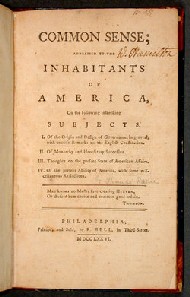
Paine’s common sense was an attack on not thinking. It was not thinking that enabled monarchs and the aristocracy to maintain their hold and monopoly on power. Thinking about the basis and purpose of civil society triggered a process of enlightenment that showed custom and existing power structures to be, above all, indefensible. Human society had to justify itself under the aggressive glare of Reason.
Following Locke’s attack on absolute monarchy in The Second Treatise of Government, Paine’s pamphlets achieve a new pitch of lucid intensity. By exposing hereditary right to be an imposition having its roots and justification in a distant right of conquest, he disarms any monarchy and aristocracy at one fell swoop, leaving them nothing but appeals to tradition and/or repressive violence to fall back on. Kings and Lords have no rational arguments to justify their ‘rights’.
For common sense it is obvious that those living under a monarchy are deceived and enslaved:
... a race of conquerors arose, whose government, like that of William the Conqueror, was founded in power, and the sword assumed the name of a sceptre. Governments thus established last as long as the power to support them lasts; but that they might avail themselves of every engine in their favor, they united fraud to force, and set up an idol which they called Divine Right, and which, in imitation of the Pope, who affects to be spiritual and temporal, and in contradiction to the Founder of the Christian religion, twisted itself afterwards into an idol of another shape, called Church and State. The key of St. Peter and the key of the Treasury became quartered on one another, and the wondering cheated multitude worshipped the invention.
When I contemplate the natural dignity of man, when I feel (for Nature has not been kind enough to me to blunt my feelings) for the honour and happiness of its character, I become irritated at the attempt to govern mankind by force and fraud, as if they were all knaves and fools, and can scarcely avoid disgust at those who are thus imposed upon.*
Paine’s lucid ‘disgust’ with ‘those who are imposed upon’ is only matched by his contempt for those who would impose their cowardly acceptance of vassalage on future generations. This is his main beef with hereditary succession and with Burke in The Rights of Man.
Rather than seeing England’s ‘Glorious Revolution’ of 1688 as a triumph of Parliament and the beginning of constitutional government, Paine saw it as a cowardly, expensive and irrational imposition on the future. The ‘revolution’ deposed a Catholic king only to import a Dutch aristocrat to take his place: it perpetuated the vassalage of government over the people.
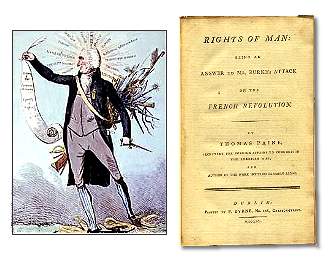
In The Rights of Man (1791), Paine fulminates against Burke for denying that the English had any right ‘to choose their own governors, cashier them for misconduct, or frame a government for themselves.’
... To prove this, he quotes a declaration made by Parliament about a hundred years ago, to William and Mary, in these words: "The Lords Spiritual and Temporal, and Commons, do, in the name of the people aforesaid" (meaning the people of England then living) "most humbly and faithfully submit themselves, their heirs and posterities, for EVER." He quotes a clause of another Act of Parliament made in the same reign, the terms of which he says, "bind us" (meaning the people of their day), "our heirs and our posterity, to them, their heirs and posterity, to the end of time."
Mr. Burke conceives his point sufficiently established by producing those clauses, which he enforces by saying that they exclude the right of the nation for ever. And not yet content with making such declarations, repeated over and over again, he farther says, "that if the people of England possessed such a right before the Revolution" (which he acknowledges to have been the case, not only in England, but throughout Europe, at an early period), "yet that the English Nation did, at the time of the Revolution, most solemnly renounce and abdicate it, for themselves, and for all their posterity, for ever." *
While Burke harks melodramatically bark to a past protected from criticism by the rituals of custom and opacity of obscurantism, Paine is a fundamentally forward-looking thinker. One of the basic tenets of his thought is that the present generation has no right to shackle the future by tying posterity into contracts born of cowardice or expediency in the present.
As far as Paine is concerned, as long as the ‘tyrannies’ of monarchy and aristocracy are part and parcel of government, then government is not truly constitutional, i.e. it is not government of the people, and the administration of power is inevitably entangled in absurd contradictions. The argument in Common Sense which inspired the colonists to effect a complete break from the British government was one which attempted to pull the English government’s essential irrationality to pieces:
I know it is difficult to get over local or long standing prejudices, yet if we will suffer ourselves to examine the component parts of the English Constitution, we shall find them to be the base remains of two ancient tyrannies, compounded with some new Republican materials.
First. — The remains of Monarchical tyranny in the person of the King.
Secondly. — The remains of Aristocratical tyranny in the persons of the Peers.
Thirdly. — The new Republican materials, in the persons of the Commons, on whose virtue depends the freedom of England.
The two first, by being hereditary, are independent of the People; wherefore in a CONSTITUTIONAL SENSE they contribute nothing towards the freedom of the State.
To say that the constitution of England is an UNION of three powers, reciprocally CHECKING each other, is farcical; either the words have no meaning, or they are flat contradictions.
First. — That the King it not to be trusted without being looked after; or in other words, that a thirst for absolute power is the natural disease of monarchy.
Secondly. — That the Commons, by being appointed for that purpose, are either wiser or more worthy of confidence than the Crown.
But as the same constitution which gives the Commons a power to check the King by withholding the supplies, gives afterwards the King a power to check the Commons, by empowering him to reject their other bills; it again supposes that the King is wiser than those whom it has already supposed to be wiser than him. A mere absurdity!
There is something exceedingly ridiculous in the composition of Monarchy; it first excludes a man from the means of information, yet empowers him to act in cases where the highest judgment is required. The state of a king shuts him from the World, yet the business of a king requires him to know it thoroughly; wherefore the different parts, by unnaturally opposing and destroying each other, prove the whole character to be absurd and useless. *
As we shall see, this dismissal of the division of power as an absurdity is perhaps a bit hasty, but when Paine wrote speed was of the essence.

Paine’s common sense was Reason as War Machine: a self-taught mind taking on and fighting off the state at breakneck speed. Designed to be disseminated and processed rapidly, inflammatory and intense, his pamphlets were indispensable, hot-off-the-press weaponry for generals and diplomats. Common Sense and The Crisis are profound examples of thought and argument being instrumental in reality production.
In the colonies, the Enlightenment achieved it’s most compressed, intense expression, with lucidity on a breakaway line of flight far removed from the servile infatuation with authority and turgid philosophical tomes which characterized the Enlightenment in Europe.
Of course, the American Revolution came packaged with own contradictions and hypocrisy, with many of the authors of the high-minded, idealistic Declaration of Independence and the United States Constitution being slave-owners. But in the unprecedented clarity that illuminated America at this time these contradictions were painfully clear. Paine, an outspoken advocate of the abolition of slavery, was first an foremost an inspiration: his thought spread enlightenment so quickly that society soon found its ideals to be out of time with its social and economic realities. With Paine, thought was ahead of its time, not enslaved to it.
Paine’s common sense provides proof that, fantastically ignorant as we may be when it comes to metaphysics and our own minds, the really big questions that affect us on a daily basis – Do you want to live under tyranny or not? What is the optimal basis and form of government? – can actually be answered and communicated clearly and concisely. It is the abandonment of common sense in favour of priestly absurdities such as dialectical materialism which lead human society back into ignorance, obscurity and vassalage.
2. Virtual Involvement
Norman Davies, in Europe, A History:
“Of course, no one in 1776 could possibly have foreseen the full potential of the USA. The thirteen colonies still looked to be very fragile ventures, surrounded by the uncontrolled forces of nature in a largely unexplored continent... At the time, the British government was blind to even the most immediate implications.” (p637)
Well, not quite no one. If it were reformulated as ‘no one in Europe’, then fair enough. Because the success of the American Revolution depended on people in those colonies having an inspirational premonition of the largely unexplored continent’s potential. The USA was a product of imaginative foresight; of seeing, seizing and laying claim to what could be:
The Sun never shined on a cause of greater worth. 'Tis not the affair of a City, a County, a Province, or a Kingdom; but of a Continent — of at least one-eighth part of the habitable Globe. 'Tis not the concern of a day, a year, or an age; posterity are virtually involved in the contest, and will be more or less affected even to the end of time, by the proceedings now. Now is the seed-time of Continental union, faith and honour. The least fracture now will be like a name engraved with the point of a pin on the tender rind of a young oak; the wound would enlarge with the tree, and posterity read in it full grown characters. *
Common Sense and The Crisis (1776-7) invoke an inevitable future in order to steel resolve in the present. Of course it was possible to continue negotiations with the British government, to once again submit the neck to the yoke of ‘tyranny’, but this would have amounted to both a cowardly betrayal of the future and a deferral of the inevitable. At times, Paine resorts to cajolery:
I once felt all that kind of anger, which a man ought to feel, against the mean principles that are held by the Tories: a noted one, who kept a tavern at Amboy, was standing at his door, with as pretty a child in his hand, about eight or nine years old, as I ever saw, and after speaking his mind as freely as he thought was prudent, finished with this unfatherly expression, "Well! give me peace in my day." Not a man lives on the continent but fully believes that a separation must some time or other finally take place, and a generous parent should have said, "If there must be trouble, let it be in my day, that my child may have peace;" and this single reflection, well applied, is sufficient to awaken every man to duty. Not a place upon earth might be so happy as America. Her situation is remote from all the wrangling world, and she has nothing to do but to trade with them. A man can distinguish himself between temper and principle, and I am as confident, as I am that God governs the world, that America will never be happy till she gets clear of foreign dominion. Wars, without ceasing, will break out till that period arrives, and the continent must in the end be conqueror; for though the flame of liberty may sometimes cease to shine, the coal can never expire. *
At times, he waxes almost mystical:
I HAVE never met with a man, either in England or America, who hath not confessed his opinion, that a separation between the countries would take place one time or other: And there is no instance in which we have shown less judgment, than in endeavoring to describe, what we call, the ripeness or fitness of the continent for independence.
As all men allow the measure, and vary only in their opinion of the time, let us, in order to remove mistakes, take a general survey of things, and endeavor if possible to find out the VERY time. But I need not go far, the inquiry ceases at once, for the TIME HATH FOUND US. The general concurrence, the glorious union of all things, proves the fact.
As is perhaps the case with all ‘successful’ revolutions, time was of the essence: the colonists pulled their revolution off chiefly because their ‘opinion of the time’ was superior to that of the myopic power they were trying to outwit and shake off.
Part of Paine’s persuasive power lay in his straightforward presentation of financial facts and calculations. He had no qualms about combining philosophical-political argument with the prices of ships:
For a ship of
100 guns...... 35,553 £
90 " .......... 29,886
80 " .......... 23,638
70 " .......... 17,785
60 " .......... 14,197
50 " .......... 10,606
40 " .......... 7,558
30 " .......... 5,846
20 " .......... 3,710 *
Crucially, neither did he have any qualms about making the future pay for the revolution. The future had to be literally indebted to the present:
Debts we have none: and whatever we may contract on this account will serve as a glorious memento of our virtue. Can we but leave posterity with a settled form of government, an independent constitution of its own, the purchase at any price will be cheap. But to expend millions for the sake of getting a few vile acts repealed, and routing the present ministry only, is unworthy the charge, and is using posterity with the utmost cruelty; because it is leaving them the great work to do, and a debt upon their backs from which they derive no advantage. Such a thought's unworthy a man of honour, and is the true characteristic of a narrow heart and a piddling politician.
The debt we may contract doth not deserve our regard if the work be but accomplished. No nation ought to be without a debt. A national debt is a national bond; and when it bears no interest, is in no case a grievance. Britain is oppressed with a debt of upwards of one hundred and forty millions sterling, for which she pays upwards of four millions interest. And as a compensation for her debt, she has a large navy; America is without a debt, and without a navy; yet for the twentieth part of the English national debt, could have a navy as large again. The navy of England is not worth at this time more than three millions and a half sterling. *
The American Revolution would not have been possible without a financial contribution from the future.
3. Make Commerce, Not War
Besides, what have we to do with setting the world at defiance? Our plan is commerce, and that, well attended to, will secure us the peace and friendship of all Europe; because it is the interest of all Europe to have America a free port. *
In all my publications, where the matter would admit, I have been an advocate for commerce, because I am a friend to its effects. It is a pacific system, operating to cordialise mankind, by rendering nations, as well as individuals, useful to each other. As to the mere theoretical reformation, I have never preached it up. The most effectual process is that of improving the condition of man by means of his interest; and it is on this ground that I take my stand. If commerce were permitted to act to the universal extent it is capable, it would extirpate the system of war, and produce a revolution in the uncivilised state of governments. The invention of commerce has arisen since those governments began, and is the greatest approach towards universal civilisation that has yet been made by any means not immediately flowing from moral principles. *
In Paine’s presentation, war is a tool used to tax and impoverish civil society. Tyrannical, uncivilized governments divert attention from their indefensible basis by engaging in wars which further the interest of government and hereditary rule, not society. There is a conflict of interest. War is in the interest of governments which reciprocally bolster each other’s grip by bleeding their societies dry. It is in the interest of individuals and society to trade. While the winners of war are governments, commerce is non-zero-sum exchange and benefits the whole of civilisation:
... the prosperity of any commercial nation is regulated by the prosperity of the rest. If they are poor she cannot be rich, and her condition, be what it may, is an index of the height of the commercial tide in other nations.
There can be no such thing as a nation flourishing alone in commerce: she can only participate; and the destruction of it in any part must necessarily affect all. When, therefore, governments are at war, the attack is made upon a common stock of commerce, and the consequence is the same as if each had attacked his own. The present increase of commerce is not to be attributed to ministers, or to any political contrivances, but to its own natural operation in consequence of peace...
...If a merchant in England sends an article of English manufacture abroad which costs him a shilling at home, and imports something which sells for two, he makes a balance of one shilling in his favour; but this is not gained out of the foreign nation or the foreign merchant, for he also does the same by the articles he receives, and neither has the advantage upon the other. The original value of the two articles in their proper countries was but two shillings; but by changing their places, they acquire a new idea of value, equal to double what they had first, and that increased value is equally divided. *
Paine loathed war and yet called for it against the British. His justification for war is eminently rational: civil society has to protect itself and its commerce from the depredations and encroachments of tyrannical government.
4. Positive Fictions
The concept of natural rights is central to Paine’s onslaught, and it goes hand in hand with his faith in Reason and his optimistic view of human nature. In a smooth mixture of Locke and Rousseau, Paine assumes ‘man’ to be born equal and endowed with certain natural rights, among which he stresses: intellectual rights and freedom of conscience; the right to trade freely; and the right to pursue comfort and happiness. In the state of nature, ‘man’ also has a right to judge and administer justice, but on entering the compact of civil society, ‘man’ gives up this right. *
In a schema which borrows heavily from Locke, society is drawn as positive, whilst government is cast as ‘a necessary evil’:
Society is produced by our wants, and government by our wickedness; the former promotes our happiness POSITIVELY by uniting our affections, the latter NEGATIVELY by restraining our vices. The one encourages intercourse, the other creates distinctions. The first is a patron, the last a punisher. *
In its optimal form, government functions solely to protect freedoms and provide security. In its worst form – i.e. absolute – government is the greatest disgrace and shame of humanity.
The closer society stays to ‘the laws of nature’ the better it functions.
Man, with respect to all those matters, is more a creature of consistency than he is aware, or than governments would wish him to believe. All the great laws of society are laws of nature. Those of trade and commerce, whether with respect to the intercourse of individuals or of nations, are laws of mutual and reciprocal interest. They are followed and obeyed, because it is the interest of the parties so to do, and not on account of any formal laws their governments may impose or interpose.
But how often is the natural propensity to society disturbed or destroyed by the operations of government! When the latter, instead of being ingrafted on the principles of the former, assumes to exist for itself, and acts by partialities of favour and oppression, it becomes the cause of the mischiefs it ought to prevent. *
For Paine, human history has consisted of little more than an abuse of natural rights by governments, a tale of continual enslavement.
It might be helpful to ask a few questions at this point: What exactly are these natural rights? What’s the evidence for them?
... backtrack to Locke
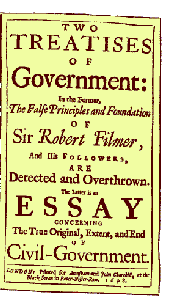
In The Second Treatise of Government, Locke defines the state of nature for 'mankind' as:
...a state of perfect freedom to order their actions, and dispose of their possessions and persons, as they think fit, within the bounds of the law of nature, without asking leave, or depending upon the will of any other man. *
The state of nature is far from being a brutish free-for-all: it is bounded and governed by the laws of nature:
The state of nature has a law of nature to govern it, which obliges every one: and reason, which is that law, teaches all mankind, who will but consult it, that being all equal and independent, no one ought to harm another in his life, health, liberty, or possessions: for men being all the workmanship of one omnipotent, and infinitely wise maker; all the servants of one sovereign master, sent into the world by his order, and about his business; they are his property, whose workmanship they are, made to last during his, not one another's pleasure: and being furnished with like faculties, sharing all in one community of nature, there cannot be supposed any such subordination among us, that may authorize us to destroy one another, as if we were made for one another's uses, as the inferior ranks of creatures are for our's. Every one, as he is bound to preserve himself, and not to quit his station wilfully, so by the like reason, when his own preservation comes not in competition, ought he, as much as he can, to preserve the rest of mankind, and may not, unless it be to do justice on an offender, take away, or impair the life, or what tends to the preservation of the life, the liberty, health, limb, or goods of another.*

Being a prime example of pre-Darwinian, mind-before-matter thinking, the concept of natural rights comes packed with the following assumptions:
1. God designed nature.
2. Nature is subject to rational laws.
3. ‘Men’ were designed equal, in terms of their faculties and nature.
The conclusions drawn from these assumptions are:
1. The laws of nature oblige ‘mankind’ to treat each other equally and, where possible, to protect and serve the species.
2. Slavery breaks God’s laws and is therefore irrational.
In the state of nature, all ‘men’ have the natural right to administer their own justice in rational proportion to any offence committed against them or their property. On entering society, 'man' gives up his right to administer justice himself but retains all 'his' other natural rights:
MEN being, as has been said, by nature, all free, equal, and independent, no one can be put out of this estate, and subjected to the political power of another, without his own consent. The only way whereby any one divests himself of his natural liberty, and puts on the bonds of civil society, is by agreeing with other men to join and unite into a community for their comfortable, safe, and peaceable living one amongst another, in a secure enjoyment of their properties, and a greater security against any, that are not of it. This any number of men may do, because it injures not the freedom of the rest; they are left as they were in the liberty of the state of nature. When any number of men have so consented to make one community or government, they are thereby presently incorporated, and make one body politic, wherein the majority have a right to act and conclude the rest. *
Having laid down this premise, Locke draws a startlingly bold conclusion: If civil society requires consent and is governed by the will of the majority, then absolute monarchy is uncivilized: it is one individual administering their natural right to justice as they see fit, which is to say that absolute monarchy is not just like the state of nature – it is the state of nature, or rather the state of nature at its worst because under absolute monarchy other men are deprived of their natural right to administer justice. Society under absolute monarchy is slavery: the deprivation of natural rights. Since slavery is irrational and against the laws of God, man has a duty to rebel against absolute monarchy. Man is free to withhold consent and form new societies elsewhere:
The other objection I find urged against the beginning of polities, in the way I have mentioned, is this, viz.
Sec. 113. That all men being born under government, some or other, it is impossible any of them should ever be free, and at liberty to unite together, and begin a new one, or ever be able to erect a lawful government.
If this argument be good; I ask, how came so many lawful monarchies into the world? for if any body, upon this supposition, can shew me any one man in any age of the world free to begin a lawful monarchy, I will be bound to shew him ten other free men at liberty, at the same time to unite and begin a new government under a regal, or any other form; it being demonstration, that if any one, born under the dominion of another, may be so free as to have a right to command others in a new and distinct empire, every one that is born under the dominion of another may be so free too, and may become a ruler, or subject, of a distinct separate government.
... Sec. 115. For there are no examples so frequent in history, both sacred and profane, as those of men withdrawing themselves, and their obedience, from the jurisdiction they were born under, and the family or community they were bred up in, and setting up new governments in other places; from whence sprang all that number of petty commonwealths in the beginning of ages, and which always multiplied, as long as there was room enough, till the stronger, or more fortunate, swallowed the weaker; and those great ones again breaking to pieces, dissolved into lesser dominions. All which are so many testimonies against paternal sovereignty, and plainly prove, that it was not the natural right of the father descending to his heirs, that made governments in the beginning, since it was impossible, upon that ground, there should have been so many little kingdoms; all must have been but only one universal monarchy, if men had not been at liberty to separate themselves from their families, and the government, be it what it will, that was set up in it, and go and make distinct commonwealths and other governments, as they thought fit. *
The importance of these passages for the projection and production of the USA is obvious (but somehow can’t be stressed enough). The concept of natural rights triggered a train of thought which led directly to insurrection in the colonies and the production of a new country. Natural rights are the code at the core of the USA, given explicit expression in the Declaration of Independence and being implicit in the The Constitution. Whatever Locke’s personal hypocrisy with regard to slavery, the concept of natural rights was the concept which made the founding fathers squirm with discomfort, which ultimately led to the abolition of slavery, and which empowered the 60s Civil Rights movement.
From a certain point of view, it is largely irrelevant whether the concept of natural rights has any truth content. It is a pre-Darwinian, positive fiction. Even if humans are not born equal, civil society requires that they be treated as such.
5. Dangerous Delusions
Paine in footnote 28 of The Rights of Man:
During the suspension of the old governments in America, both prior to and at the breaking out of hostilities, I was struck with the order and decorum with which everything was conducted, and impressed with the idea that a little more than what society naturally performed was all the government that was necessary, and that monarchy and aristocracy were frauds and impositions upon mankind. On these principles I published the pamphlet Common Sense. *
This observation of society functioning in a perfectly civilized fashion without government was Paine’s chief inspiration for writing Common Sense. It also seemed to be empirical evidence which supported Locke and Rousseau’s idyllic descriptions of the state of nature.
It is one of the cruel ironies of history that Paine, the man who helped instigate the American Revolution and who supported the French Revolution so fervently and articulately, should have found himself awaiting execution at the hands of the Jacobins during the Reign of Terror in 1794. He only managed to avoid the guillotine through pure chance.

Though most of the scathing criticism with which Paine rips Burke to pieces is well-deserved and spot-on, there are a few points of prescient lucidity occasionally shining through Burke’s conservative old-fart ranting which Paine could have profited from paying a bit more heed to.

1. One of Burke’s most pertinent criticisms of The National Assembly is that there was no check upon its power:
The power, however, of the House of Commons, when least diminished, is as a drop of water in the ocean, compared to that residing in a settled majority of your National Assembly. That assembly, since the destruction of the orders, has no fundamental law, no strict convention, no respected usage to restrain it. Instead of finding themselves obliged to conform to a fixed constitution, they have a power to make a constitution which shall conform to their designs. Nothing in heaven or upon earth can serve as a control on them. (p45 Reflections, Oxford)
In the passage cited above from Common Sense, Paine dismissed the division of power in the English government, with its powers supposedly ‘reciprocally CHECKING each other’, as ‘farcical’ and ‘flat contradictions’. While the actual system may not have stood up to the scrutiny of reason in 1776, by rejecting the principle of a division of power, Paine thereby rejected the means by which constitutional government can be prevented from seizing, or being hijacked by, absolute power.
Back to Locke again:
... And because it may be too great a temptation to human frailty, apt to grasp at power, for the same persons, who have the power of making laws, to have also in their hands the power to execute them, whereby they may exempt themselves from obedience to the laws they make, and suit the law, both in its making, and execution, to their own private advantage, and thereby come to have a distinct interest from the rest of the community, contrary to the end of society and government: therefore in well ordered commonwealths, where the good of the whole is so considered, as it ought, the legislative power is put into the hands of divers persons, who duly assembled, have by themselves, or jointly with others, a power to make laws, which when they have done, being separated again, they are themselves subject to the laws they have made; which is a new and near tie upon them, to take care, that they make them for the public good. *
The division of power that Locke outlined in The Second Treatise of Government was conceived precisely to avoid the kind of law-making madness and tyranny the French Revolution hurtled into.
2. Burke took a dim view of human nature and recognized that base passions are at work behind even the most idealistic schemes; and so Burke’s only political recommendation is caution. In contrast, Paine saw no need for checks and balances in government because he had unbounded faith in human nature, once it had thrown off the evils of imposed government:
Who could have foreseen, or who could have believed, that a French National Assembly would ever have been a popular toast in England, or that a friendly alliance of the two nations should become the wish of either? It shows that man, were he not corrupted by governments, is naturally the friend of man, and that human nature is not of itself vicious. That spirit of jealousy and ferocity, which the governments of the two countries inspired, and which they rendered subservient to the purpose of taxation, is now yielding to the dictates of reason, interest, and humanity. *
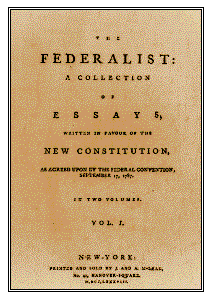
Paine left America in 1787, the year before James Madison wrote The Federalist No. 51. as part of a project urging support for the United States Constitution. Another irony of history is that Paine, the man who coined the term ‘The United States of America’, wrote The Rights of Man seemingly oblivious to the more pessimistic thinking that characterized the rationale for the American Constitution. In this oft-quoted passage, James Madison justifies the checks and balances built into the American government with explicit reference to the ambitious and competitive nature of human beings:
But the great security against a gradual concentration of the several powers in the same department, consists in giving to those who administer each department the necessary constitutional means and personal motives to resist encroachments of the others. The provision for defense must in this, as in all other cases, be made commensurate to the danger of attack. Ambition must be made to counteract ambition. The interest of the man must be connected with the constitutional rights of the place. It may be a reflection on human nature, that such devices should be necessary to control the abuses of government. But what is government itself, but the greatest of all reflections on human nature? If men were angels, no government would be necessary. If angels were to govern men, neither external nor internal controls on government would be necessary. In framing a government which is to be administered by men over men, the great difficulty lies in this: you must first enable the government to control the governed; and in the next place oblige it to control itself. A dependence on the people is, no doubt, the primary control on the government; but experience has taught mankind the necessity of auxiliary precautions.

A bold simplification would have to say that the French Revolution descended into a bloodbath, dictatorship and pan-continental war simply because there were no efficient checks in place and because the noxious side of human nature was allowed free rein.
Paine’s anger with Burke for his having denied the future its natural rights seems to prevent him from seeing the significance of England’s so-called ‘Glorious Revolution’ of 1688. It’s significance lies not in the Whigs importation of yet another foreign king, but in the decisive reduction of monarchical power in favour of Parliament.
Norman Davies describes the American Revolution as having been “wrested from a country which was one of the most free and best-governed of the day.” (Europe p638). Indeed, while the failings of the French Revolution can largely be blamed on the absence civil society preceding it, and on key figures in the revolution having an excessive trust in human nature, the successful production of the USA came directly from (the conceptualisation of) a cautious mixture of freedom and government in England. Absurd and pathetic as constitutional monarchy might be, in Paine's time it was actually the most fertile ground for truly productive revolt.
The near future absolutely definitely needs (at least) one of these.

(via Glenn Reynolds)